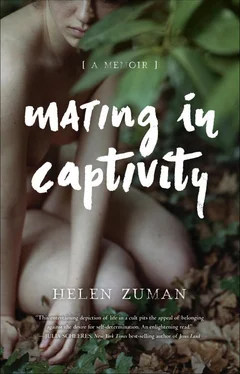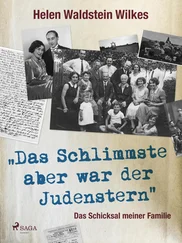Since my return, I’d taken charge of tending the “sickies”—those shunted to the trailer, supposedly to keep bugs at bay. (They spread anyway.) Time in the trailer meant eons alone, with little to do but wonder how you’d caused yourself to fall ill—and agonize over what theories might be roaming the Farm. You could go a day or more without visitors, especially if you were single or your relationship was suspected of making you sick. Defenses down, you embraced any care offered—meals, news, herbal remedies—even by a fellow outcast.
Arol’s need for cancer treatment, like the sickies’ isolation, warmed her to bonding with the least of her followers—and granted me a chance to help save her life, as I believed she’d saved mine.
I broke the silence. “I don’t care how much it costs. I’d sell New Orleans for two weeks straight if it would help you get well.”
The room burst into a supportive chorus. “Thank you, Helen,” she said.
Days later, New Orleans erupted the muck beneath my pledge.
It was Halloween weekend. I was driving with five other sellers through a city park to Voodoo Fest when I caught myself committing what I saw as thought crime.
Outside, lush meadows rolled by under wet sky. My mind wandered to Arol’s battle with cancer. She would have a hysterectomy. She would retreat to Mexico. When she returned, she would start chemo. But none of these tactics guaranteed victory.
What if she dies?
Thinking that Arol might die was crime enough. Yet I pressed on. How might life at the Farm change in the wake of her death? To my shock, I did not see a flock of lost sheep, stumbling in grief. Instead, I imagined bounding up the steps to the Addition, striding down the hall to the kitchen, without the usual rush of adrenaline. Worse, I imagined asking Prophet for a date—with a chance he’d say yes.
I did not lust after Prophet. I did feel the pull of the one man who shared Arol’s grasp of lasting love. What mysteries had enfolded only him?
Mar—the power seller who’d passed out TurboCharge the last day of my first Mardi Gras—pulled into a parking spot near the festival’s vendor entrance. I snapped back to the present. When the four men on our crew left to sneak our food and ammo into the venue, I turned to Mar, heart thumping. I had to confess.
“Hey, can I tell you something? I know it’s super dumb, but I feel like if I don’t let it out, I’ll bomb.”
Mar was the trip’s leader. All she wanted was to call home each morning with a high number.
“Sure,” she said. “Go ahead.”
I leaped straight to my worst offense. “Well, I just noticed myself having this awful thought—that maybe if Arol died, I’d get to have sex with Prophet. I mean, it’s horrible! I don’t want Arol to die! But I had that thought, and now it’s like this evil growth filling my brain.”
Mar twirled a red ringlet around her forefinger. Tugged at the clutch of bogus passes hanging from the mirror. I squirmed, awaiting her verdict.
“Isn’t this one of those things you do to sabotage yourself? Aren’t you just freaking out about selling?”
I nodded, weak with relief. She’d neither damned me as a traitor nor demanded I leave.
“Don’t worry about it. We all have bad thoughts. We come from a Deathculture.” She flashed me a half smile. “We do the best we can.”
I smiled back, silently vowing not to trespass again.
Yet I did feel more at home, with Arol and most of her inner circle gone.
They departed the day after Thanksgiving in a large RV, leaving the rest of us to wonder how we’d bear up without them. Would we go “square”? Cave to our neuroses? Implode?
Within days, we knew we’d make it. Within a week, I found that I could indeed visit the Addition with a steady heart. I’d never felt such ease at the Farm.
Midway through December, the home crew started on a collaborative art project: a mockumentary spoofing our fear of losing it. We’d send the finished video to Mexico as a Christmas gift.
In one scene, a new guy who had a crush on Karma knelt in front of a four-by-eight-foot blackboard, mapping her every move with a fresh chalk track. In another, Rayel—our interim financial manager—gaily threw money away. Garbed in a filmy scarf and sparkly earrings, hair swept up in a twist, she sat at Arol’s desk with a feathered pen and a checkbook. As strings raced and cymbals crashed, she signed check after check, ripped it from the book, and tossed it with laughter over her shoulder.
I took my star turn in the Tupperware cupboard.
As a young Zendik, I’d appointed myself guardian of the Farm’s Tupperware: haphazard stacks of tubs in a range of makes and shapes, a mess of lids shoved in a basket. I hated the last-minute—often late-night—hunt for lids to tubs already filled with road food; I flinched when I saw the wrong lid taped to a tub in the cooler. If only each tub were stored with its lid on it , the needless hunt for mates would end.
No! I was told. Space was scarce. Tubs must nest; lids must mix. My best hope was the periodic purge: I’d pull out all the tubs and lids and match what I could, then pack the unpaired off to Tupperware Purgatory (a cardboard box stowed in the Farmhouse) to await their mates’ return (largely in vain).
In my scene, I plunged into the jumbled cupboard, swearing I’d have it tidy in no time. A beat later, seeing some lids had gone missing, I fell back in a dead faint.
Before mailing the video to Mexico, we popped it into the Farmhouse VCR and watched it over and over, crying with laughter. It captured our love for each other—and a dream of what life as one body could be: we’d joined, with joy, in work we owned.
Arol and company, homesick for the Farm, loved our gift. Swan’s boyfriend, Noi, reciprocated with a snappy animation of a line of pink flamingos bopping in lockstep to a rock beat.
The day Arol’s RV rolled up the driveway, Prophet touched my arm in the Addition kitchen and thanked me for the rap song I’d penned and taped for his mid-December birthday. I treasured the gentle twinkle in his eyes, humbly meeting mine; I imagined it signaled a merging of inner and outer circles. Might the new year—just begun—bring a new start?
A day or so later, Arol, exhausted and fragile, called me to the pantry doorway. Four months earlier, cutting me with her double-edged greeting, she’d commanded its breadth; now, voice ragged, she sagged against one jamb. “I’d like you to try singing with me,” she said, “once I’m well enough to do music again.”
“Thank you! I’d love to.”
I’d once loved singing in church, and with my mother and sisters at home. I’d long wanted to sing with Arol in the band. But what thrilled me more than her proposal (which would come to little) was the warmth coursing under it—the warmth, at last, of welcome.
[ chapter 10 ]
Untamed Flame
SAUTÉING DINNER VEGGIES IN a cast-iron skillet, I stole glances at Dylan, the visitor Eile had just shown into the kitchen. He looked feral and young. A patchwork coat quilted his bony frame. A coarse headband curbed a riot of curls.
By February 2003, more than three years had passed since my own first supper. Quarantine endured: visitors still had to wait ten days before they could cook, wash dishes, or share the common dishware. Dylan’s bowl was labeled, as mine had been, with his name on a strip of masking tape.
The protein that night was baked chicken. At the butcher block, Dylan plucked the lid from a pan of fragrant legs and breasts. Dismay shaded his face. He glanced at Eile, serving herself opposite him. “Um, is there anything besides chicken? I’m a vegetarian.”
I turned from the stove and caught his eye for the first time. “I can make you lentil patties,” I said.
Читать дальше











